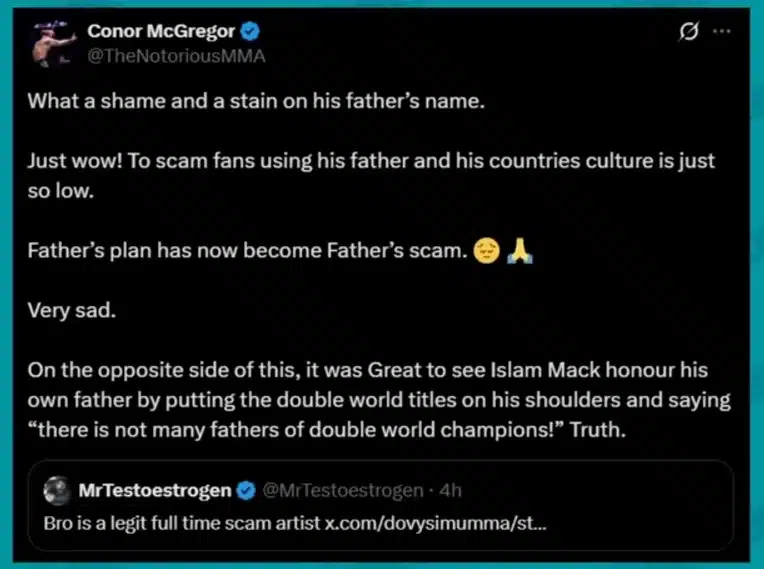McGregor Questions Khabib’s Papakha NFTs as Bitcoin Surges Past $90K
BTC/USDT
$23,298,561,101.23
$66,025.52 / $63,030.00
Change: $2,995.52 (4.75%)
-0.0012%
Shorts pay
Contents
The McGregor-Khabib NFT controversy erupted when Conor McGregor accused Khabib Nurmagomedov’s Papakha NFT project of being a scam after promotional posts vanished post-sale. This feud highlights accountability issues in celebrity crypto ventures, with on-chain sleuth ZachXBT pointing out McGregor’s similar past project.
-
McGregor’s accusation: Targeted Khabib’s use of Dagestani culture and his late father’s name in the NFT drop, claiming fans were scammed.
-
Khabib’s defense: Described the Papakha NFTs as a tribute to his heritage and father, not a cash grab.
-
ZachXBT’s intervention: Highlighted McGregor’s own 2022 NFT launch that followed a similar promotional pattern and disappearance, raising hypocrisy questions.
Discover the McGregor-Khabib NFT controversy shaking crypto: accusations of scams in Papakha NFTs amid rising regulatory scrutiny. Explore key details and implications for celebrity tokens. Stay informed on Web3 accountability.
What is the McGregor-Khabib NFT Controversy?
The McGregor-Khabib NFT controversy involves a public spat between UFC rivals Conor McGregor and Khabib Nurmagomedov over Khabib’s Papakha NFT project. McGregor labeled it a scam after the promotional content was removed following a successful sale that raised over $4.4 million. This exchange revives their long-standing feud while spotlighting transparency concerns in the non-fungible token space.
How Did McGregor Launch His Attack on Khabib’s NFT Project?
The dispute ignited on November 26 when McGregor took to social media platform X, formerly Twitter, to criticize Nurmagomedov. He alleged that Khabib exploited Dagestani cultural symbols and the memory of his late father, Abdulmanap Nurmagomedov, to deceive fans into buying digital assets. The Papakha NFTs, modeled after the traditional hat Khabib wore during his undefeated UFC tenure, consisted of 29,000 unique pieces sold exclusively through Telegram channels.
According to reports from blockchain analytics, the collection sold out rapidly, generating substantial revenue in under 25 hours. However, the swift deletion of promotional materials post-sale fueled suspicions. McGregor posted a now-deleted message questioning Khabib’s integrity, stating it was unbelievable that the “good guy” would engage in such practices. He further remarked that what began as a father’s plan had devolved into a “father’s scam,” expressing sadness over the alleged betrayal of fans.
In response, Khabib dismissed McGregor’s claims as lies from an “absolute liar.” He emphasized the project’s genuine intent as a digital homage to his heritage and family legacy, clarifying it served as a cultural keepsake rather than a profit-driven scheme. This back-and-forth not only reignited personal animosity but also drew attention to the volatile nature of celebrity-endorsed crypto initiatives.

Source: X
On-chain investigator ZachXBT, known for exposing crypto frauds, added fuel to the fire by referencing McGregor’s own “McGregor Realm” NFT endeavor from 2022. That project, heavily marketed before fading into obscurity, mirrored the promotional tactics McGregor decried. ZachXBT’s pointed query—”Sound familiar?”—in a later-deleted post, suggested a double standard, prompting wider discussions on celebrity responsibility in blockchain ventures.
Experts in the crypto field, such as those from blockchain research firms like Chainalysis, have long warned about the risks of influencer-driven NFTs. A 2023 report from Chainalysis indicated that over 20% of celebrity NFT projects faced community backlash due to poor transparency or unmet promises. This incident exemplifies how personal rivalries can amplify these systemic issues, potentially eroding trust in the NFT market, which saw trading volumes dip to $8.7 billion in the third quarter of 2024, per NonFungible data.
Frequently Asked Questions
What triggered the McGregor-Khabib NFT feud?
The feud began when Conor McGregor accused Khabib Nurmagomedov of scamming fans with his Papakha NFT collection after promotional posts on Telegram were deleted following a $4.4 million sale. McGregor highlighted the use of cultural elements and Khabib’s late father’s name as exploitative tactics.
Why is the Papakha NFT project significant in crypto culture?
The Papakha NFTs represent a blend of personal heritage and digital innovation, honoring Khabib’s Dagestani roots through blockchain. As voice searches for celebrity NFTs rise, this project illustrates how athletes leverage Web3 to create lasting digital memorabilia, though it also invites scrutiny on ethical marketing practices.
Key Takeaways
- Revived Rivalry in Crypto: The McGregor-Khabib NFT controversy shows how old UFC grudges spill into blockchain, turning personal attacks into public debates on digital asset integrity.
- Transparency Challenges: Deleted promotions post-sale in both fighters’ projects underscore the need for better disclosure in celebrity NFTs, as echoed by investigators like ZachXBT.
- Regulatory Implications: With cases like the UK’s Basis Markets collapse involving NFT schemes, this feud signals increasing oversight on crypto promotions to protect investors.
Conclusion
The McGregor-Khabib NFT controversy encapsulates the intersection of MMA legacy and blockchain innovation, where accusations of scams in the Papakha project have spotlighted accountability in celebrity crypto endeavors. As the global crypto market cap climbs back toward $3.12 trillion amid Bitcoin’s rally past $90,000, such disputes remind participants of the importance of due diligence. Investors should prioritize verified projects and stay attuned to evolving regulations to navigate this dynamic space effectively.
Comments
Other Articles
Bitcoin Price Analysis: Will the Uptrend Continue?
3/1/2026
Ethereum 2.0 Update: How Will It Affect the Crypto Market?
2/28/2026
The Coming of Altcoin Season: Which Coins Will Stand Out?
2/27/2026
DeFi Protocols and Yield Farming Strategies
2/26/2026
